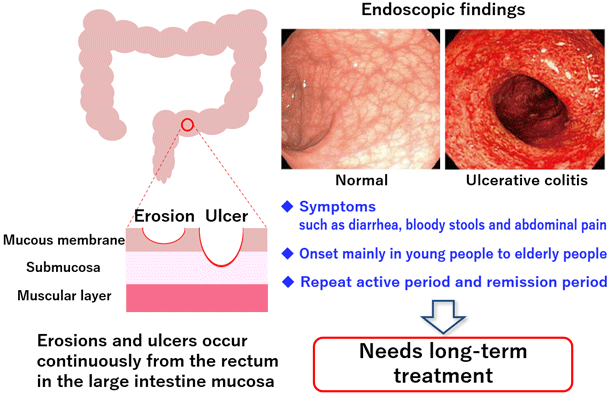What kind of disease is ulcerative colitis?
Ulcerative colitis (UC) is an inflammatory disease of the large intestine (colon) that causes erosions and ulcers on the mucous membrane of the large intestine.
Characteristic symptoms are diarrhea, bloody stools, and abdominal pain.
Lifelong treatment and follow-up examinations are required, as well as hospitalization in some cases, making daily activities and social life difficult.
The cause of UC is unknown.
Lifelong treatment and follow-up examinations are required, as well as hospitalization in some cases, making daily activities and social life difficult.
The cause of UC is unknown.
How many people suffer from ulcerative colitis?
It is estimated that UC afflicts around 200,000 people in Japan and more than 5 million people worldwide.
What kind of people suffer from ulcerative colitis?
UC affects all age groups, from young children to the elderly, but is most common in the age range of 20 to 35.
It affects men and women equally.
It affects men and women equally.
What are the symptoms of ulcerative colitis?
Diarrhea and bloody stools are observed. UC may also be accompanied by cramping or persistent abdominal pain.
In severe cases, systemic symptoms such as fever, weight loss, and anemia occur.
In severe cases, systemic symptoms such as fever, weight loss, and anemia occur.
How is ulcerative colitis diagnosed?
UC is generally identified through a process of differential diagnosis. After the course of symptoms and medical history of a patient are observed, a comparison is made with other infectious diseases that cause diarrhea to distinguish UC from other possible causes of the symptoms.
Next, an endoscopic examination of the colon is performed to observe the form and extent of the inflammation and ulcers that have developed. To assist in diagnosis, a sample of intestinal mucosa is taken for biopsy.
At the present time there is no available test method for immediately diagnosing ulcerative colitis.
Next, an endoscopic examination of the colon is performed to observe the form and extent of the inflammation and ulcers that have developed. To assist in diagnosis, a sample of intestinal mucosa is taken for biopsy.
At the present time there is no available test method for immediately diagnosing ulcerative colitis.
How is ulcerative colitis treated?
Treatments for ulcerative colitis (UC) include both internal medical and surgical treatments.
- (1) Medical treatment
The purpose of current medications is to inhibit abnormal inflammation of the large intestine and to control symptoms.- ・ Oral administration of 5-aminosalicylic acid (5-ASA) drugs, corticosteroid drugs, and immunomodulatory or immunosuppressive drugs
- ・ Cytapheresis, i.e., blood cell component removal therapy (removing abnormally activated white blood cells from the blood)
- ・ Intravenous or subcutaneous injections of biopharmaceuticals (e.g., TNF-alpha receptor antagonists)
- (2) Surgical treatment
During the course of their disease, 5-10% of UC patients will need surgery (total colectomy).
Although an artificial anus is sometimes created, surgery to connect the small intestine and anus has become the mainstream in recent years.
What is the typical course of ulcerative colitis?
Symptoms improve or disappear (remission) in many patients. However, they often recur, so to remain in remission, patients usually require ongoing medical treatment.
Some patients do not experience remission with medical treatment and end up requiring surgery.
After seven years from the onset of UC, there is an increased risk of developing colorectal cancer, so a regular colonoscopy is required, even when no symptoms are observed.
Some patients do not experience remission with medical treatment and end up requiring surgery.
After seven years from the onset of UC, there is an increased risk of developing colorectal cancer, so a regular colonoscopy is required, even when no symptoms are observed.
What are the prospects for ulcerative colitis patients?
UC patients will probably still need to go to hospital for the rest of their lives for ongoing treatment and regular examinations, regardless of the severity of their symptoms.
However, if a diagnostic agent that enables easy diagnosis of UC were widely available, treatment could be started at an early stage. This would make it possible to minimize the severity of symptoms in many cases. In addition, if there were a simple marker capable of determining the efficacy of UC drugs, it would be possible to reduce the need to perform endoscopies.
There is currently no drug that can completely cure IC, but if such a drug could be developed, we could provide enormous relief to the many people who suffer from UC, by eliminating the pain and other hindrances that make life so difficult for them.
On the next page, we will explain some of the research work and discoveries that our team has come up with. If you would like to support our work, your contribution would be most welcome.
However, if a diagnostic agent that enables easy diagnosis of UC were widely available, treatment could be started at an early stage. This would make it possible to minimize the severity of symptoms in many cases. In addition, if there were a simple marker capable of determining the efficacy of UC drugs, it would be possible to reduce the need to perform endoscopies.
There is currently no drug that can completely cure IC, but if such a drug could be developed, we could provide enormous relief to the many people who suffer from UC, by eliminating the pain and other hindrances that make life so difficult for them.
On the next page, we will explain some of the research work and discoveries that our team has come up with. If you would like to support our work, your contribution would be most welcome.




